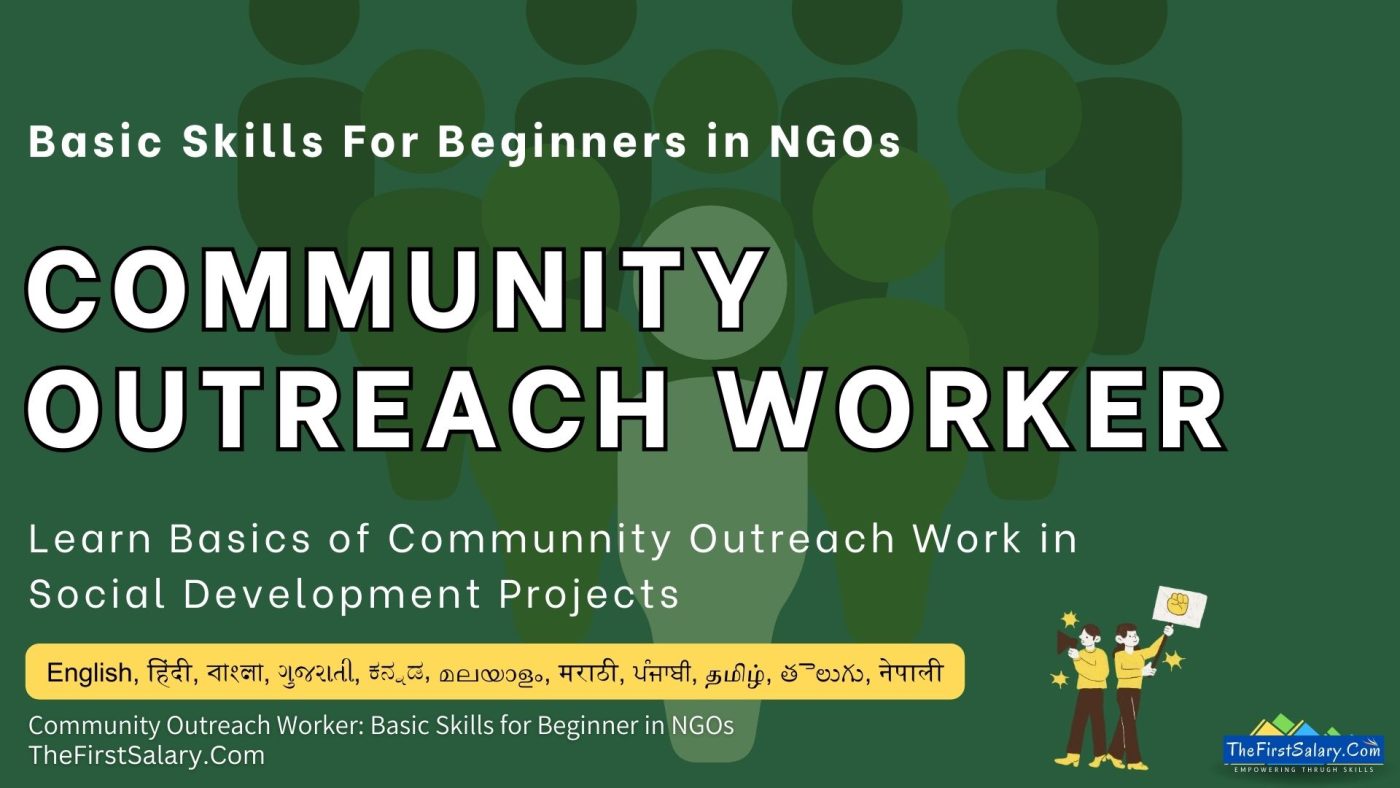Categories
NGO Jobs Skills
0 (0 Ratings)
Community Outreach Worker: Basic Skills for Beginners in NGOs

About Course
Welcome to the "Community Outreach Worker: Basic Skills for Beginners in NGOs" course! This course equips you with essential skills for roles like Outreach Worker, Field Coordinator, Outreach Coordinator and more. Through this course, you'll explore the importance of community engagement, address social challenges, and understand legal and ethical issues. Each module offers practical lessons with examples, exercises, case studies, and role-plays to build your confidence and skills.
Whether you're new to outreach work or have some experience, this course is designed to help you succeed with easy-to-understand content and practical tips.Ready to make a difference? Enroll now and start your journey to positive change!
What I will learn?
- Comprehensive Understanding on Basics of Outreach Work.
- Project Planning and Implementation.
- Community Engagement Techniques.
- Data Collection.
- Risk Assessment and Safety Precautions.
- Collaborating with Stakeholders.
- Monitoring and Evaluation.
- Effective Communication.
- Legal and Ethical Considerations.
- Professional Development for Outreach Workers.
- Interactive Learning Methods.
Course Curriculum
Introduction to the e-Learning Course
This introduction lesson will guide you step by step on how to make the most of this course.
Module 1: Understanding the Role of Outreach Workers
In this module, you learn the fundamental aspects of outreach work, exploring its significance in social development and the pivotal role outreach workers play in fostering positive change within communities.
Module 2: Project Planning and Implementation
This module equips learners with the basic essential skills needed to effectively plan and execute outreach activities. From understanding clear project goals to aligning activities with organizational vision, learners gain practical insights into project management strategies tailored for outreach initiatives.
Lesson 1: Grasping Project Goals and Objectives
Lesson 2: Basics of Project Planning
Lesson 3: Developing Micro-plans for Outreach Activities
Lesson 4: Aligning Activities with Organizational Vision
Lesson 5: Understanding Project Budgets
Lesson 6: Project Implementation and Monitoring Support
QUIZ: Multiple Choice Question
Module 3: Effective Communication
Module 3: Effective Communication
Effective communication lies at the heart of successful outreach work. In this module, you may explore some basic diverse communication techniques tailored for engaging with target communities, building rapport, and fostering meaningful dialogue with stakeholders.
Lesson 1: Importance of Communication in Outreach Work
Lesson 2: Effective Communication with Target Communities
Lesson 3: Building Rapport with Community Members
Lesson 4: Conducting Community Meetings
Lesson 5: Conflict Resolution and Mediation Techniques
Lesson 6: Conducting Regular Team and Stakeholder Meetings
Lesson 7: Effective Communication with Stakeholders
QUIZ: Multiple Choice Question
Module 4: Community Engagement Techniques
Engaging with communities lies at the core of impactful outreach efforts. This module provides you with participatory approaches and practical tools to effectively involve communities in decision-making processes and empower local volunteers for sustainable change.
Lesson 1: Basic Participatory Approaches in Community Engagement
Lesson 2: Conducting Field Visits and Community Meetings
Lesson 3: Empowering Community Volunteers
Lesson 4: Engaging with other local NGOs and Community Leaders
QUIZ: True or False
Module 5: Legal and Ethical Considerations
Navigating the legal and ethical landscape is crucial for outreach workers. This module offers insights into relevant legal frameworks, ethical guidelines, and strategies for maintaining confidentiality while aligning outreach activities with organizational goals.
Lesson 1: Understanding Legal Frameworks for Outreach Work
Lesson 2: Ethical Guidelines for Outreach Workers
Lesson 3: Ensuring Confidentiality and Privacy
Lesson 4: Understanding and Contributing to Organizational Goals
Module 6: Data Collection
Data serves as a cornerstone for informed decision-making in any social development project. This module equips learners with the necessary skills on outreach to collect, manage, and utilize data effectively, ensuring project success and driving continuous improvement.
Lesson 1: Basics of Data Collection Methods
Lesson 2: Collecting Baseline Data for Informed Initiatives
Lesson 3: Data Entry
Lesson 4: Periodic Data Collection and Reporting
Lesson 5: Utilizing Data for Informed Decision Making
QUIZ: Multiple Choice Questions
Module 7: Risk Assessment and Safety Precautions
In this module, you may focus on understanding potential risks in outreach work and implementing safety precautions to ensure the well-being of outreach workers and community members.
Lesson 1: Identifying Potential Risks in Outreach Work
Lesson 2: Safety Precautions and Protocols
Lesson 3: Emergency Response and Crisis Management
Lesson 4: Learning from Real Outreach Scenarios
QUIZ: Multiple Choice Question
Module 8: Collaborating with Stakeholders
In this module, you may explore the importance of collaborating with stakeholders, particularly local government departments and NGOs, to enhance the impact of outreach initiatives
Lesson 1: Building Partnerships with local Government departments
Lesson 2: Engaging with Community Leaders and local NGOs
Lesson 3: Effective Communication with Stakeholders
QUIZ: True or False
Module 9: Monitoring and Evaluation
This module gets into monitoring frameworks, evaluation techniques, and strategies for utilizing feedback to enhance outreach activities and performance.
Lesson 1: Understanding Monitoring and Evaluation Frameworks
Lesson 2: Importance of Monitoring and Evaluation in Outreach Work
Lesson 3: Conducting Field Visits and Community Meetings
Lesson 4: Monitoring Project Activities for Effectiveness
Lesson 5: Utilizing Feedback for Continuous Improvement
Lesson 6: Reporting: Weekly, Monthly, Quarterly, and Annual
Lesson 7: Periodic Review of Projects and Adaptation
QUIZ: Multiple Choice Questions
Module 10: Professional Development for Outreach Workers
Professional growth and self-care are integral components of a successful social work career. In this module, learners explore career pathways, skill acquisition strategies, and self-care practices tailored for personal and professional development in the field of outreach work.
Lesson 1: Career Pathways in Outreach Work
Lesson 2: Skill Acquisition for Personal and Career Growth
Lesson 3: Self-care and Burnout Prevention Strategies
Assignment for Module 10: Career Development Action Plan
Module 11: Course Recap and Resources
In this module, we’ll cover key final steps: avoiding common mistakes, reviewing course highlights, and understanding important terms to ensure your readiness for success.
Common Mistakes and How to Prevent Them
Glossary of Key Terms
Course Recap
Earn a certificate of completion.
Earn this certificate of completion after enhancing your basic skills & increased knowledge base.

Student Ratings & Reviews

No Review Yet
Material Includes
- 1. Online Study Materials: Engaging and informative lessons covering key aspects.
- 2. Interactive Quizzes: Short quizzes after most of the module to test your understanding and reinforce learning.
- 3. Case Studies: Real examples to illustrate the applications.
- 4. Assignments: Practical assignments to help you apply what you've learned.
- 5. Certification: A certificate of completion upon successfully finishing the course.
₹100.00
₹500.00
(GST inclusive)*
- LevelBeginner
- Duration33 hours
- Enrollment validityEnrollment validity: 180 days
- CertificateCertificate of completion
Hi, Welcome back!
A course by

Sanjeev Kumar
Director- General Academy for Basic Brilliance and Upskilling

TheFirstSalary.Com
General Academy for Basic Brilliance and Upskilling
Target Audience
- 1. Job Seekers in Social Work
- 2. Career Starters in NGOs
- 3. College Graduates
- 4. High School Graduates (10+2)
- 5. Nonprofit and NGO Outreach Workers
- 6. Field Workers in Social Development Project (Field Coordinator, Field Facilitator, and Outreach Coordinator)
Requirements
- 1. Age: 18 years or above
- 2. Minimum Educational Qualification: 10+2 or Graduate level education in any field.
- 3. Work Experience: 0 to 3 years of experience in social work, community organizing, or related areas, although not mandatory.
- 4. Computer or Mobile Device with Internet Access: Ensure you have a reliable device and internet connection to access course materials.
- 5. Basic Computer Literacy: Ability to navigate online platforms, access online materials, and submit assignments online.
- 6. Language Proficiency: Basic understanding of English to comprehend course content and participate in activities. Translations may be available, but accuracy is not guaranteed.
- 7. Time Commitment: To complete the 11-module course, you may need about 5 to 6 weeks, investing 6 to 8 hours per week, with each module taking approximately 3 hours.
- 8. Commitment to Learning: Dedication to actively participate in the course, complete assignments, and engage with fellow learners to maximize learning outcomes.
- 9. Open-mindedness: Willingness to explore new ideas, perspectives, and approaches to community outreach work.
- 10. Passion for Community Development: Genuine interest in making a positive impact on communities and addressing social issues through outreach initiatives.
- 11. Communication Skills: Effective verbal and written communication skills to interact with community members, stakeholders, and fellow learners.
